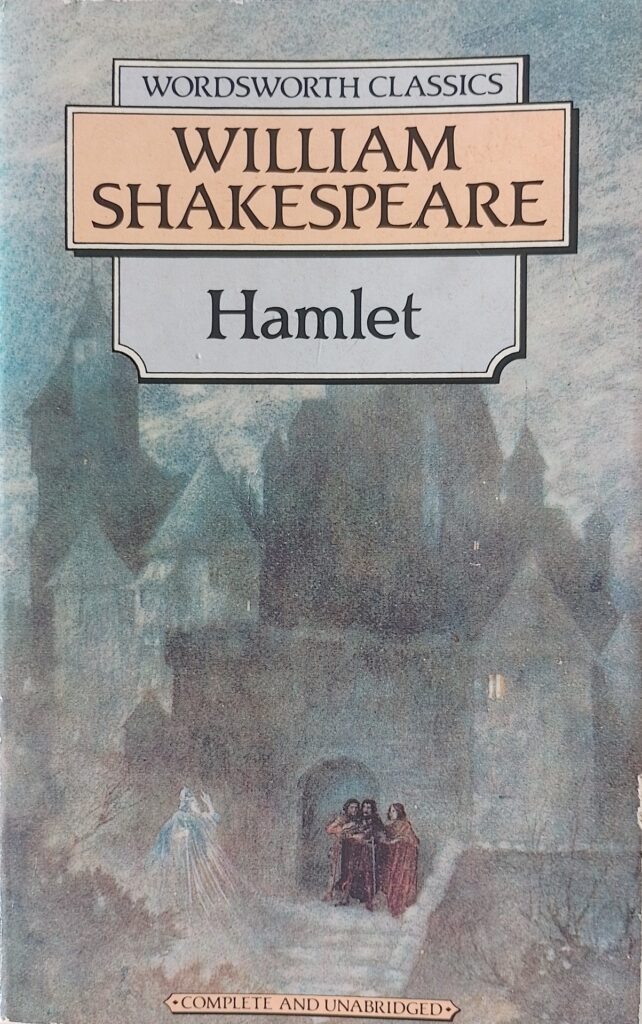First published c.1603. Wordsworth Classics paperback, 1992, pp 138, c.27,600 words.
Coming at Shakespeare’s writing, cold on the page, for the first time can seem impenetrable. Not only are their many archaic words used but also the speech patterns are far from those of the present age. Here it is hard to grasp some of the basics of the plot, the pacing appears hugely uneven with sudden story leaps interspersed with long soliloquies reflecting a character’s state of mind. Two characters suddenly become (or seem to become) insane, one to the point of death. The cast of characters is long and confusing: two are called Hamlet – father and son, and two Fortinbras, similarly (although Fortinbras father never appears, and the son is a minor character). The final scene, where many of the principle characters kill each other, comes across as ludicrous. Shakespeare, as true man of the theatre, makes use of many theatrical devices such as the appearance of a ghost and the use of a play within the play.
An additional distraction is the numerous often-quoted phrases that leap off the page, instantly recognisable amongst the period language. The Penguin Dictionary of Quotations, J. M and M.J Cohen, 1960, has over two hundred from the play, and in my recent reading I picked out thirty-four familiar to me: for example: ‘To be or not to be, that is the question’ [P60, A3.S1.L56], ‘Neither a borrower nor a lender be’ [p21, A1.S3.L75], ‘More in sorrow than in anger’ p17, A1,S2,L232], etc., etc. It can seem like a stream of cliches strung together, but, if course, this is where those cliches originated (presumably). And how many fans of the 1979-81, popular, British, TV sit-com, To the Manor Born, knew the title was drawn from Hamlet? Although Shakespeare wrote it ‘manner’ [p23, A1, S4, L15], which gives it a rather different meaning.
Much work has been done to identify the sources on which the play is based, and the plot seems to have been well known at the time Shakespeare wrote his version. It concerns a young man, Hamlet, a prince whose father, the former king Hamlet, has recently died and the throne taken by Claudius the former king’s brother. Claudius has also just married Prince Hamlet’s mother. We learn in the first scene that King Hamlet recently won a combat, killing Fortinbras (senior), king of Norway, and thereby winning some of his territory. Fortinbras (senior)’s brother inherited his throne and Fortinbras (son), eager to recover his father’s territory, is amassing an army. Hamlet senior’s ghost appears and informs Hamlet junior that he was murdered by Claudius. Thus we have a set-up of two sons out for revenge for the deaths of their fathers. The play is mainly concerned with how to respond to such a situation. Can one be certain of what happened and who is guilty? What is the honourable, Christian, safe, moral, human course of action? Is bloody revenge right? Thinking too much can be fatal, but then so can over-hasty action. It is in the contemplation of this dilemma that the power of the play lies.
An additional layer to appreciation of the play is the knowledge that Shakespeare own son was named Hamnet, and who died in 1596, aged eleven (https://en.wikipedia.org/wiki/Hamnet_Shakespeare).
There is very little commentary in this edition, just a very brief introduction (one and a half pages) and a half page summary of Shakespeare life and five suggestions for further reading.
I might understand the play better, and appreciate it more, if I saw it on stage. The only version I recall seeing is the Zeffirelli film version of 1990. There are translations into modern English on-line and a good plot summary on Wikipedia which would be worth reading before first encountering the play in performance or reading the script. As the play is held in such high esteem, and is so often quoted from, it is worthwhile making the effort to have at least some familiarity with it.
Wikipedia biography of Shakespeare: https://en.wikipedia.org/wiki/William_Shakespeare
Wikipedia summary of the play: https://en.wikipedia.org/wiki/Hamlet#Texts
Others’ reviews of the book: https://www.goodreads.com/book/show/1420.Hamlet?from_search=true&from_srp=true&qid=Ab59m8hbOx&rank=2 and this one for a single fine review: https://www.goodreads.com/book/show/7169244-hamlet-william-shakespeare?from_search=true&from_srp=true&qid=Ab59m8hbOx&rank=3
© William John Graham, March 2024

